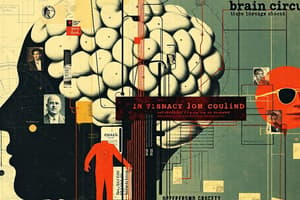Podcast
Questions and Answers
What is the Opponent-Process Theory?
What is the Opponent-Process Theory?
- A single process mechanism that solely focuses on positive emotions
- A dual process mechanism that balances emotional responses (correct)
- An approach that ignores physiological reactions to stimuli
- A theory that states emotions are always short-lived
What occurs as a result of seeing a loved one according to the Opponent-Process Theory?
What occurs as a result of seeing a loved one according to the Opponent-Process Theory?
Feelings of happiness
What happens with frequent repetition of a positive experience?
What happens with frequent repetition of a positive experience?
A compensatory response begins to follow
The 'A' process diminishes slowly in response to a stimulus.
The 'A' process diminishes slowly in response to a stimulus.
What does the 'B' process do in the Opponent-Process Theory?
What does the 'B' process do in the Opponent-Process Theory?
The strength of the 'B' process increases with repeated exposure.
The strength of the 'B' process increases with repeated exposure.
What must responses to stimuli be in order to serve a purpose?
What must responses to stimuli be in order to serve a purpose?
Flashcards are hidden until you start studying
Study Notes
Opponent-Process Theory Overview
- Opponent-Process Theory explains the dual processes of emotional response, balancing intensity with a compensatory mechanism.
- Emotions are a physiological and psychological reaction to stimuli, which cannot persist indefinitely.
Response to Stimuli
- Initial stimuli evokes an immediate emotional response. For example, seeing a loved one typically generates happiness.
- Repeated experiences lead to a compensatory emotional response that can diminish the original feeling.
Compensatory Responses
- Over time, with the absences of loved ones, negative feelings like dejection may arise.
- Frequent exposure to a loved one may still elicit positive emotions, but the impact of those feelings may lessen due to developed compensatory responses.
Primary and Compensatory Processes
- 'A' Process: Immediate emotional response to a stimulus, characterized by a quick onset and fading alongside the stimulus (e.g., joy from seeing a loved one).
- 'B' Process: A gradual compensatory response aimed at restoring emotional balance, with a slower onset and prolonged duration compared to 'A'.
Strengthening of Opponent Processes
- With repeated exposure to emotional stimuli, the strength and duration of the 'B' process increase, helping to manage the intensity of the 'A' process.
- This adaptive mechanism aids coping with stress that is unavoidable, but can become counterproductive in cases of escapable stress.
Impact of Homeostasis
- To maintain emotional stability, responses to stimuli must hold significance; prolonged elevated or diminished emotional states become ineffective.
- Typically, emotional responses are moderated, allowing for adaptable responses under varying conditions, ensuring resilience to both positive and negative stimuli.
Studying That Suits You
Use AI to generate personalized quizzes and flashcards to suit your learning preferences.



